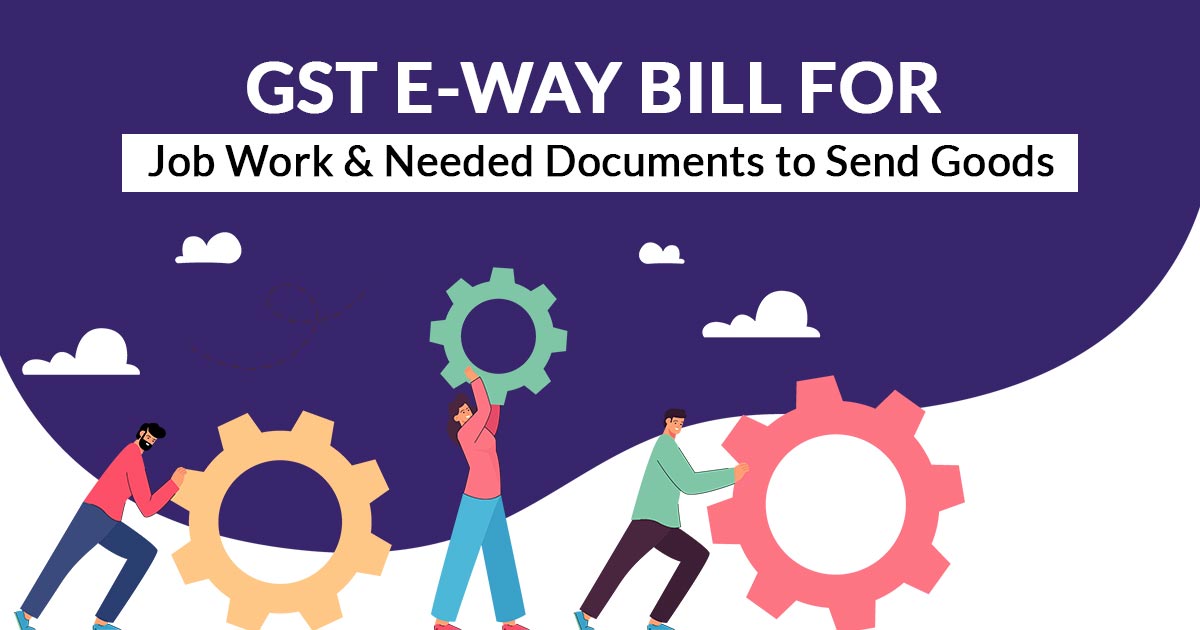
What is the term E-way Bill for Job Work?
The outsourcing of a portion of the manufacturing process to a third-party vendor/contractor is called job work. Hence the manufactured goods are transported from the premises of the principal (the entity that allocates the task to the third party) to that of the job worker (the entity opting for the task and is liable to complete the job. Sometimes, these consignments need to cross state borders to attain the final destination. In these cases, the generation of the e-way bill is needed.
Below are the four conditions beneath which either of the related parties might need to generate the GST e-way bill for the job work.
They are mentioned as:
- The principal issues the goods to the job worker
- The job worker ships the goods to the principal after finishing the work
- The job worker sends the inputs back to the principal after job completion
- Finished goods are directly given to the end customer after the finish of the job
Let’s see these cases and find who is needed to generate the e-way bill in each of those cases.
Goods Sent to a Job Worker by Principal
When the goods have been sent by the outsourcer to the job worker located in a distinct state, the former would compulsorily have to generate the e-way bill towards the job work according to the standard procedure. Even when the value of the goods is beneath Rs 50,000 the outsourcer would require to generate the e-way bill for the job work.
Inputs Obtained by the Principal After the Finish of the Job Work
As the job worker finishes the task, the outsources are directed to call back for the goods to their premises. Or they could ask the job worker to provide them directly to the end customers. When the job worker has an e-way bill portal id, they would require to generate the e-way bill to get them to the marketplace. If this position is not like that then the outsourcer will require to generate the eway bill for job work.
Finished Goods Supplied Directly to the Customer From the Job Worker
From the premises of the job worker, when the finished goods are supplied to the end-user, it is essential that:
- The job worker should be enrolled beneath section 25 of the GST Act,
- The outsourcer should mention that the place of the job worker is his other place of business.
When the job workers enrolled themselves on the e-way bill portal then they should generate the e-way bill for the job work themselves. When not the outsourcer should generate the e-way bill for the job work.
Supplier Sending Goods to the Job Worker
In this case, the supplier of the principal would need to generate the e-way bill for the job work.
What is the Method to Generate the E-way Bill for the Job Work?
One needs to follow the below-mentioned steps:
- Log on to the Eway bill portal with your enrolled user name and password.
- Tap on Generate new E-way bill
- Set the type of transaction as Job work
Post to that you would be required to furnish your GST number, product description, delivery challan number, along with the additional related details about your identity or the product to generate a job work e-way bill.
Required Documents Before Sending Particular Goods for Job Work
The mentioned documents are required to be filed prior to sending the goods for the job work:
- Date and delivery number of the challan
- GSTIN, address, and name of the consignor and the consignee. GST Identification Number (GSTIN) is required to be furnished when any or both parties are enrolled.
- Harmonised System of Nomenclature (HSN) code of the goods
- Quantity of the supplied goods
- Taxable value of such goods
- Applicable GST rate and the payable GST amount
- Place of supply
- Signature of the issuer
Documents to be Carried While Goods’ Transporting
The mentioned below are the documents that should be on the transporter during transporting the goods for the job work:
- Job work eway bill copy
- Delivery challan
- The copy of the invoice for the case of the goods which are being sent through the vendor of the principal to the job worker.